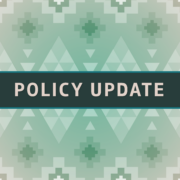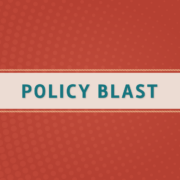President Biden Proposes a 15% Increase for Indian Health Service, 5% Increase for Urban Indian Health for FY 2025
The FY 2025 budget request includes $95 million for urban Indian health, a 5% increase over the FY 2024 enacted amount, mandatory funding through FY 2033, and an IHS exemption from sequestration.
On March 11, 2024, the Indian Health Service (IHS) published their Fiscal Year (FY) 2025 Congressional Justification with the full details of the President’s Budget, which includes $95 million for Urban Indian Health – a 5% increase above the FY 2024 enacted amount of $90.4 million. The President’s proposal included a total $130.7 billion in discretionary funding for the Department of Health and Human Services (HHS) and $8 billion in funding for IHS, a 15% increase above the FY 2024 enacted amount of $6.96 billion. The budget request also includes $260 million in proposed mandatory funding for the Special Diabetes Program for Indians (SDPI), bringing the total IHS funding to 8.2 billion. The proposal maintains the IHS budget should be moved to mandatory funding and includes $979 million in indefinite discretionary appropriation for Contract Support Costs and $349 million for Section 105(l) Leases.
Budget Caps and Debt Limit Impacts
The President’s budget reflected a discretionary spending request that was in line with caps set under the 2023 debt limit deal. This means that while there was a decrease in the President’s overall budget request in comparison to FY 2024 request, the Indian Health Service and the Urban Indian Line Item still received an increase over the FY2024 enacted amount.
Mandatory Funding and Advance Appropriations
The budget transitions IHS funding from advance appropriations to full mandatory funding for IHS from FY 2026 to FY 2034 to the amount of $288.9 billion over ten-years, as well as exempting IHS from sequestration. On January 29, 2024, the National Council of Urban Indian Health (NCUIH) sent a letter to Congressional Leadership to request that Congress protect the Indian Health Service (IHS) from sequestration in the fiscal year 2024 funding bill. This mandatory formula would culminate in $42 billion for IHS in FY 2033, to account for inflation, staffing increases, long-COVID treatment, and construction costs. This move from discretionary to mandatory funding is essential as noted in the IHS Congressional Justification, “Mandatory funding is the most appropriate, long-term solution for adequate, stable, and predictable funding for the Indian health system.”
NCUIH Efforts to Support Tribal Request for FY 2025
The National Council of Urban Indian Health (NCUIH) requested full funding for urban Indian health for FY 2025 at $965.3 million and at least $53.85 billion for IHS in accordance with the Tribal Budget Formulation Workgroup (TBFWG) recommendations. The marked increase for FY 2025 is due to Tribal leaders’ budget recommendations to address health disparities that have historically been ignored.
NCUIH Supports President’s Legislative Proposals
The President’s Budget includes potential legislative solutions to address workforce challenges in Indian Country. These proposals include meeting the IHS loan repayment/scholarship service obligation on a half-time basis and providing tax exemptions for IHS professions scholarship and repayment programs. NCUIH has endorsed the IHS Workforce Parity Act (S. 3022) which expands healthcare provider access to IHS scholarship and loan repayment programs, including scholarships for half-time clinical practice. The President’s budget also proposes that U.S. Public Health Service Commissioned Officers be permitted to be detailed directly with UIOs. On May 24, 2022, the National Council of Urban Indian Health (NCUIH) sent a letter to the Chairs of the House and Senate Appropriations Committees, expressing NCUIH’s support for detailing Public Health Service Commission Officers (PHSCOs) to Urban Indian Organizations (UIOs).
Next Steps
The Appropriations Committees will review the President’s Budget for consideration as they craft their bills for FY 2025. NCUIH will submit testimony and send letters to House and Senate Appropriators to request full funding for FY2025. NCUIH will continue to work with the Biden Administration and Congress to push for full funding of urban Indian health in FY 2025.
| Line Item | FY23 Enacted | FY24 Enacted | FY25 Tribal Request | FY25 President’s Budget |
| Urban Indian Health | $90.42 million | $90.4 million | $973.6 million | $94.99 million |
| Indian Health Service | $6.96 billion | $ 6.96 billion | $51.4 billion | $8.2 billion |
| Advance Appropriations | $5.13 billion | $5.19 billion | ——————— | ——————— |
| Hospitals and Clinics | $2.5 billion | $2.55 billion | $12.2 billion | $2.93 Billion |
| Tribal Epidemiology Centers | $34.4 million | $34.4
million |
——————– | $34.4 million |
| Electronic Health Record System | $218 million | $190.57 million | $491.9 million | $435.1 million |
| Community Health Representatives | $65.21 million | $65.2
million |
$1.2 billion | $69.63 million |
| Mental Health | $127.1 million | $129.77 million | $3.4 billion | $138.75 million |
| IHS Cancer Moonshot Initiative | —————- | —————- | ——————— | 108 million |
| HIV & Hepatitis | $5 million | $5 Million | ——————— | $15 million |
Overview of Budget
Key Provisions for IHS, Tribal Organizations, and Urban Indian Organizations (UIOs)
- $8.1 billion for IHS for FY 2025
- $95 million for urban Indian health for FY 2025
- $979 million in indefinite discretionary funding for Contract Support Costs
- $349 million in indefinite discretionary funding for Section 105(l) Leases
- $260 million in mandatory funding up to 2026 for SDPI
Other Budget Highlights
- Addressing Targeted Public Health Challenges
- $15 million for HIV and Hepatitis C.
- UIOs eligible
- $21 million for addressing opioid use.
- UIOs eligible
- Urban Indian Health Program – Alcohol and Substance Abuse Title V Grants
- $3.4 million
- Allocates funds to the Office of National Drug Control Policy (ONDCP) budget to give resources to UIOs to provide high quality, culturally relevant prevention, early intervention, outpatient and residential substance abuse treatment services, and recovery support to address the unmet needs of the Urban Indian communities they serve.
- $3.4 million
- $15 million for HIV and Hepatitis C.
- IHS Cancer Moonshot Initiative
- $108 billion
- Develops a coordinated public health and clinical cancer initiative to implement best practices and prevention strategies to address the incidence of cancer and mortality among AI/ANs.
- UIOs eligible
- Develops a coordinated public health and clinical cancer initiative to implement best practices and prevention strategies to address the incidence of cancer and mortality among AI/ANs.
- $108 billion
- Indian Health Professions
- $81.25 million
- Offers additional IHS Scholarship and Loan Repayment awards, bolstering recruitment and retention efforts through these two high demand programs.
- UIOs eligible
- Offers additional IHS Scholarship and Loan Repayment awards, bolstering recruitment and retention efforts through these two high demand programs.
- $81.25 million
Legislative Proposals
- U.S. Public Health Service Commissioned Officers to be Detailed to Urban Indian Organizations to Cooperate in or Conduct Work Related Functions of the Department of Health and Human Services
- Proposal Description
- This amendment to the Public Health Service Act would provide IHS the discretionary authority to detail officers directly to an UIO to perform work related to the functions of HHS.
- The permittance of officers to be detailed directly to UIOs addresses the staff shortage that hinders the capacity of UIOs to improve access to health care for urban Natives. The strengthening of the IHS workforce will contribute to better health outcomes and reduce disparities.
- NCUIH Action
- Proposal Description
- Sequestration Exemption for Indian Health Program
- Proposal Description
- Amends current law to exempt IHS from future sequestration cuts.
- The services provided by the IHS are no less critical. Budget reductions of any kind have implications for the services IHS, Tribes, and Urban Indian organizations provide to American Indian and Alaska Native patients and communities.
- NCUIH Action
- January 29, 2024 Letter Requesting Exemption
- Proposal Description
- Meet Loan Repayment/Scholarship Service Obligations on a Half-Time Basis
- Proposal Description
- Permit both Indian Health Service (IHS) scholarship and loan repayment recipients to fulfill service obligations through half-time clinical practice, under authority similar to that now available to the National Health Service Corps (NHSC) Loan Repayment Program (LRP) and Scholarship Program.
- Permitting IHS scholarship and loan repayment health professional employees to fulfill their service obligations through half-time clinical practice for double the amount of time and to offer half the loan repayment award amount in exchange for a two-year service obligation could increase the number of providers interested in serving in the Indian health system.
- NCUIH Action
- NCUIH has endorsed the IHS Workforce Parity Act ( S. 3022) which expands healthcare provider access to IHS scholarship and loan repayment programs, including scholarships for half-time clinical practice.
- Proposal Description
- Provide Tax Exemption for Indian Health Service Health Professions Scholarship and Loan Repayment Programs
- The Indian Health Service (IHS) seeks tax treatment similar to that provided to recipients of scholarships and loan repayment from the National Health Service Corps (NHSC). The IHS seeks to allow scholarship funds for qualified tuition and related expenses received under the Indian Health Service Health Professions Scholarships to be excluded from gross income under section 117(c)(2) of the Internal Revenue Code of 1986 (IRC) and to allow participants in the IHS Loan Repayment Program to exclude from gross income, payments made by the IHS Loan Repayment Program under section 108(f)(4) of the IRC. With the above exemptions, the IHS programs would also be exempt from any Federal Employment Tax (FICA), making the IHS programs comparable to the current NHSC status.
- NCUIH Action:
- NCUIH has endorsed the IHS Workforce Parity Act (S. 3022) which expands healthcare provider access to IHS scholarship and loan repayment programs, including scholarships for half-time clinical practice.







